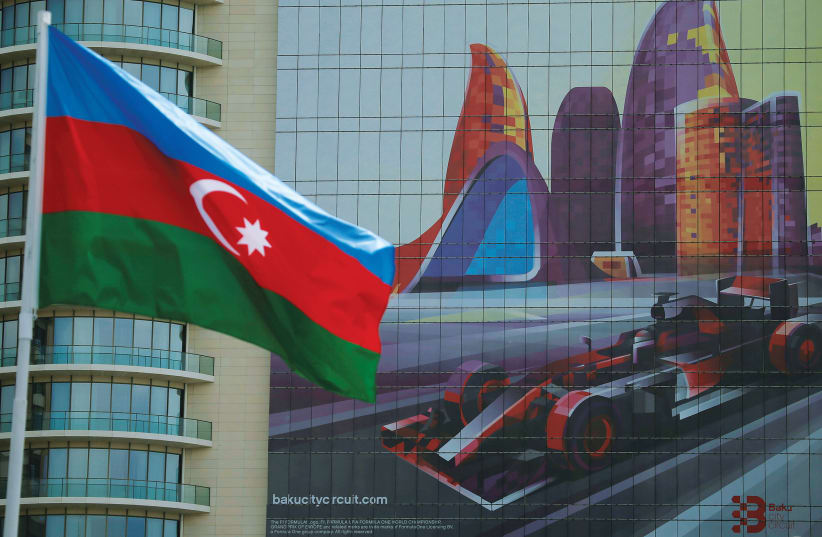With TANAP, Turkey and Azerbaijan are extending the success of their previous projects in the energy sector, aimed at meeting Europe’s and Turkey’s natural gas needs, as well as offering diversity in gas products. Previous investments signed by the two countries in the energy field include the Baku-Tbilisi-Ceyhan oil pipeline and the Baku-Tbilisi-Erzurum natural gas pipeline project, which will accelerate strategic business, while the TANAP project will continue to expand.
“TANAP is a historic project,” stated Azerbaijan President Ilham Aliyev. “Today we are writing the energy history of the 21st century together. This is a history of cooperation, a history of stability. Our energy projects bring stability to the region. All countries and companies participating in these projects are benefiting from them. People benefit from them. The implementation of such a giant project as TANAP has been possible thanks to the firm political will of the leaders of Turkey and Azerbaijan.
“This is not our first joint project,” Aliyev continued. “Prior to this, in 2006, we celebrated the opening of the Baku-Tbilisi-Ceyhan oil pipeline. In 2007, we opened the Baku-Tbilisi-Erzurum gas pipeline together. Last year, we opened the Baku-Tbilisi-Kars railway together. This shows that any project put forward on our initiative is executed because it is underpinned by our thoughtful policy, firm will and brotherhood.”
TANAP is not only important for maintaining energy security, but also for improving welfare in the countries through which the pipeline runs. The project will make a great contribution to peace and stability in the region, thanks to the United States’ and the European Union’s support for the project. TANAP is the central and longest section of the Southern Gas Corridor (SGC). The main aim of the SGC is to connect the giant Shah Deniz gas field in Azerbaijan to Europe through the South Caucasus Pipeline (SCP), TANAP and the Trans-Adriatic Pipeline (TAP). The SCP runs from Azerbaijan to Turkey through Georgia, and the TAP starts in Greece and runs to Italy through Albania and the Adriatic Sea.
In addition, it is not just bad news, but terrible news for Armenia, where official Yerevan once again is convinced they missed the chance to integrate into a new regional super project – this time, gas. This is simply because the economic and geo-economic weather in the region is no longer determined by Armenia, but by strong and independent Azerbaijan. Moreover, in Azerbaijan they directly declare that they will keep Armenia isolated as long as it continues to occupy Nagorno-Karabakh and seven adjacent regions of Azerbaijan, where they conducted notorious ethnic cleansing against more than one million Azerbaijanis in the seized lands and committed serious war crimes.
THE UN Security Council adopted resolutions 822 (1993), 853 (1993), 874 (1993) and 884 (1993), condemning the occupation of the territories of Azerbaijan and reaffirming respect for the sovereignty and territorial integrity of Azerbaijan. It confirmed that the Nagorno-Karabakh region is part of Azerbaijan, and demanded immediate, complete and unconditional withdrawal of the occupying forces from all the occupied territories of Azerbaijan. The international community supports and respects in an unequivocal and principled manner the territorial integrity and sovereignty of Azerbaijan.
TANAP, with around $8.5 billion of investment, will deliver six billion cubic meters (bcm) of Azerbaijani gas to Turkey and 10 bcm to Europe per year. The European part of the project is expected to become operational in 2020.
Currently, TANAP has four partners. The Southern Gas Corridor (SGC) holds a 58% stake in TANAP, while Turkey’s Petroleum Pipeline Corporation (BOTAŞ) and BP own 30% and 12%, respectively. Seven percent of SGC’s stake has been recently transferred to the Turkish subsidiary of the State Oil Company of the Azerbaijan Republic (SOCAR).
The implementation of this program was part of the EU policy to increase energy security and reduce dependence on the products of Gazprom, and the project itself is a splinter from the more ambitious Nabucco gas pipeline project. Once TANAP is connected to the 878-km. Trans Adriatic Pipeline (TAP), to run from Greece to Albania and then on to Italy via an undersea route – the trio of pipelines will make up the TurkStream pipeline forks, which will send gas to Turkey and Bulgaria via Black Sea routes. The aim is to further distribute TurkStream gas that arrives in the Bulgarian gas hub in Varna to Southern and Central European markets.
There is no country in our region, other than Azerbaijan, which would act as the initiator or creator of advanced bilateral formats of cooperation, and Azerbaijan has paved the way for trilateral and even four-sided formats in the region based on bilateral cooperation.
The initial throughput capacity of the TANAP gas pipeline will be 16 bcm per year. About six bcm will be supplied to Turkey, and the rest to Europe. It is clear that this is good news for Azerbaijan, where, following the era of “big oil,” the epoch of “big gas” begins, which promises both investment and political interest, and the influx of “gas dollars.”
TANAP will contribute to the energy security of Europe and Turkey. This project once again proves and confirms the geopolitical significance of Azerbaijan as a geopolitical pivot in the world and in diversifying energy security in Europe. Azerbaijan has built and developed constructive and trustful relations with the main geopolitical actors in the world.
Today Azerbaijan, as a strategic ally of Israel, occupies an important place on the international arena, and continues to maintain and strengthen its geopolitical position in the South Caucasus. It is no coincidence that Azerbaijan accounts for the 80% of the South Caucasus region’s gross domestic product. The balanced, pragmatic and multi-vector foreign policy of President Aliyev shows that the country managed to convey its position to the international community. All energy projects clearly reflect that the oil and gas strategy of Azerbaijan really provides geopolitical and geo-economic results, supporting strong regional partnerships and interactions, as well as strengthening the national economy of Azerbaijan.
The author is a political analyst.
